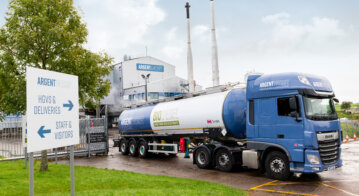New Perspectives on Traditional Fleet Visibility, with Verizon Connect
The irony is not lost on fleet managers: at a time when demand is at record levels, and consumers and businesses are embracing online ordering and delivery, logistics workforces are in crisis. Across all parts of the supply chain, companies are under tremendous pressure to meet customer expectations (ideally, to exceed them) yet struggle with finite resources and a workforce that’s dwindled in size and availability. The logistics and supply chain sectors are a buyers’ market in terms of demand and an employees’ market in recruitment.
At best, unpredictability is a key component of many fleet managers’ projections: how many drivers and staff do we have today, and how many this time next week? We can meet the demand for our services this quarter, but as for this time next year – who can say?
More than ever, therefore, insight into the minutiae of operations is essential. After all, with so many “fuzzy” variables in play, being unsure of the status of resources, real-time issues, and accruing costs could well be extra nails in the coffin.
It’s a timely reminder of the advantages that today’s fleet management platforms can bring. Making every mile count, reducing fuel costs, and reducing wear and tear on vehicles and facilities are all needed right now. Plus, today’s best platforms are deliberately interoperable: they’re designed to work with other systems both inside and from outside the business. That means up-to-date data from partners, customers and suppliers can also flow into the mix. The resulting data resources create the insight decision-makers need.
Technology may not reduce unpredictability, but solutions like Verizon Connect‘s give companies the platform of knowledge on which to build for a future – and that’s essential as demand and expectations continue to rise. The same hard data basis that describes the detail of operations will also aid automation, as systems can speak directly to each other, saving costs spent in administration and where manual and paper-based processes slow the business.

But with the very particular problems facing logistics now, can technology platforms revolutionize the industry and solve driver shortages, rising wage demands, and customer expectations that seem to relentlessly turn the thumbscrew? Not on their own, of course: what’s required is a shift in thinking by fleet managers, enacted by the powerful technology you’ll read about on these pages. As a single example, fleet telemetry solutions are always considered as a method by which managers can clamp down on drivers “behaving badly.” But instead, individual vehicle tracking in real-time can ensure that drivers are rewarded for targets hit, deliveries made and safe driving behaviour.
Similarly, in the past, fleet managers may have been guilty of wielding a big stick to wave at staff using vehicles or other company resources out of hours. But in a buyer’s employment market, offering potential new hires a monthly allotment of personal vehicle use (carefully monitored and quantified) could well keep the workforce numbers buoyant and individual drivers more engaged with management issues.
Imaginative thinking has always been part of managerial practice, and in times where the industry is under significant pressure, there’s a definite need for imagination, but coupled with the tools to empower it. Seizing the zeitgeist of environmental concerns, for example, could be the impetus to improve driving patterns. Turning off idling engines can save maybe £60 of fuel per vehicle, per month, plus a lower carbon footprint, plus less engine wear in the long term. On the flip side, the encouragement of drivers and staff to become greener in all business practices can be gamified and linked to rewards schemes. Imaginative managers equipped with the right technologies can make a significant difference.
Proper insight into costs, resource use, complementary supply chain partners’ activities and vehicle use create a bedrock of knowledge that can be extended employing the same technology. Efficient route planning is an advantage of fleet management software, but real-time re-routing when circumstances change needs the combined data from multiple external sources (warehouse management systems, road traffic feeds, weather data, and so on) as well as accurate vehicle oversight.
The bedrock of information available through the Verizon Connect solutions gives fleet managers the confidence to be more flexible, responsive, giving, and keenly observant. All it takes is an ounce of imagination and Verizon.
To find out more about how the Verizon Connect solutions can help your fleet achieve more in a market that’s pushing many companies to the wall, reach out to a representative for a demo today.









